An Olive Branch: Reaching Out to Those Affected by Abuse in Buddhist Sanghas
By Justin Whitaker
Buddhistdoor Global
| 2017-10-23 | Sexual misconduct and abuse by clergy is a widespread problem, as news reports and newspaper headlines all-too-often remind us, and American Buddhist sanghas are just as vulnerable as other religious communities. In a paper titled Sexual Misconduct of Clergypersons with Congregants or Parishioners – Civil and Criminal Liabilities and Responsibilities, the authors, faculty members at Baylor University School of Law, write:
According to recent studies, clergyperson sexual misconduct is a growing problem across an array of faith traditions. Christianity, Judaism, Islam, Buddhism and Hinduism, as well as less prominent faith traditions, are affected by clergyperson sexual misconduct. To illustrate, one study of the Church of England has found that sixty-seven percent of clergypersons responding have known a colleague who has engaged in sexual misconduct with a congregant. (Baylor University)
Dutch journalist Rob Hogendoorn, who has worked closely with cases of misconduct among Buddhist teachers around the world, was asked last year how common such allegations are in Buddhist communities: “Unfortunately, there have been widespread reports on abuse cases within Buddhist communities worldwide; not just in Asia but in the West as well, especially in the United States but also in many European countries.” Asked about responses, he said, “There have been some exceptions but mostly the Buddhist community has remained silent.” (CBC News)
One organization that aims to help in responding to cases of abuse within Buddhist communities is An Olive Branch, a project of the Zen Center of Pittsburgh that is committed to bringing a calming influence to areas of conflict and misconduct.
 Rev. Kyoki Roberts. From an-olive-branch.org
Rev. Kyoki Roberts. From an-olive-branch.orgAn Olive Branch itself arose out of an experience of conflict encountered by one of its founders, Rev. Kyoki Roberts, who relates: “I had recently returned from a meeting of Zen teachers where a respected Zen master informed us of her teacher’s sexual misconduct. She wanted to know what to say to The New York Times the next day when they were calling her to ask about his transgressions. Listening to the discussion within the group, I realized how poorly these teachers understood the misuse of power and the devastation to the sangha caused by a teacher’s unethical behavior.”
Rev. Roberts was certified in farmer-creditor, church, family, tribal, community, and labor mediation work in the 1980s and 1990s, and served as a trainer in most of those specialties. As a monastic, she continued mediation work as needed. Then, seeing the need for such services in the Buddhist community, Rev. Roberts added additional training and invited mediation professionals from Nebraska to the Zen Center of Pittsburgh to teach basic mediation, church mediation, family systems, and facilitation. And with that, she recalls, “We were now ready to hang out our shingle. An Olive Branch was born.”
When a victim of sexual abuse or a concerned sangha member contacts An Olive Branch, their process is straightforward. First, they contact the board of directors of the center and request a response based on the center’s ethics policy and procedures. At this stage, notes Rev. Roberts, “the teacher should be placed on leave and have no contact with students until the allegation has been adjudicated.”
Next, meetings and interviews are facilitated to gather all possible facts to determine whether the case is isolated or if the evidence points to a series of abuse cases. If abuse is found to have taken place, the teacher may accept responsibility, step down, seek appropriate training and specialized counseling and eventually return to teaching. However, Rev. Roberts states, “Abusers usually think the board, the sangha, and the victim(s) are to blame.” Indeed, in a white paper titled Clergy Sexual Misconduct and the Misuse of Power, An Olive Branch states:
The temptation to blame the student is powerful because people can’t believe that their beloved teacher, who carries moral and spiritual authority, who is respected and trusted, can also be guilty of misusing his power and authority.
“In any case,” notes Rev. Roberts, “The board’s fiduciary responsibility is to protect students and so they should consider the teacher’s recognition of accountability before considering reinstatement.”
 From an-olive-branch.org
From an-olive-branch.orgShe continues: “Unfortunately, most organizations where misconduct occurs don’t have proper policies and procedures in place, or the teacher has so much power no one can stand up to him.
“Let’s be clear. These relationships are not between ‘consenting adults.’ Spiritual teachers, like other professionals such as therapists or doctors, have a fiduciary responsibility to act in the best interests of the students. Almost always the student is new to the practice, far younger, and struggling with life issues. The student came seeking help and then the teacher uses the student’s vulnerability to seduce him/her.”
Regarding recent cases of alleged sexual misconduct, Rev. Roberts responds, “Prevention is the best medicine and should include board and clergy training. Every board must establish and adhere to an ethics statement and grievance procedure. If you are a board member, you have a fiduciary responsibility to protect all who come to your center! Do not wait!”
For An Olive Branch, success in these cases comes when organizations have unambiguous ethical policies and grievance procedures in place before allegations come in, so that those making the allegations have clear guidance.
When abuse does happen, it is up to the community to move forward in a healthy manner, which includes ensuring that all concerns are heard and addressed, that the removal of the teacher is considered, and that means of amends are discussed. Additionally, issues of secrecy should be discussed, education on the misuse of power provided, along with support and training for new leaders. “Clergy are encouraged to create peer relationships outside of the sangha via national meetings,” adds Rev. Roberts.
 Mediation training. From an-olive-branch.org
Mediation training. From an-olive-branch.orgThe work of An Olive Branch is not to solve problems, but to help sanghas do that work themselves. To illustrate what can be expected when An Olive Branch is brought in to mediate, an excerpt from a sample Introductory Statement reads, “We bring our training and our experience to your organization. We will not make decisions for your organization. What we bring is a process that allows you to express your feelings and ensure that at the very least you will be heard. We also hope we will capture your ideas and your hopes for going forward as a sangha.”
While it is almost certain that more cases of sexual misconduct among Buddhist clergy and teachers will occur and come to light, with the help of organizations like An Olive Branch and clear ethical guidelines and grievance procedures in all sanghas, those cases will hopefully become fewer in number and less traumatic to individuals and the broader community than they would otherwise have been.
See More
A CBC Q&A with Buddhist Rob Hogendoorn, who investigates abuse in Buddhism (CBC News)
Sexual Misconduct of Clergypersons with Congregants or Parishioners – Civil and Criminal Liabilities and Responsibilities (Baylor University)
Clergy Sexual Misconduct and the Misuse of Power (An Olive Branch)
An Olive Branch
Related features from Buddhistdoor Global
The Dogma of the Buddhist Master’s Infallibility: A Reappraisal of “Buddhist Modernism”
Airbrushing our Heroes
Buddhistdoor View: Monasticism for the Young—A Considered Choice?



















